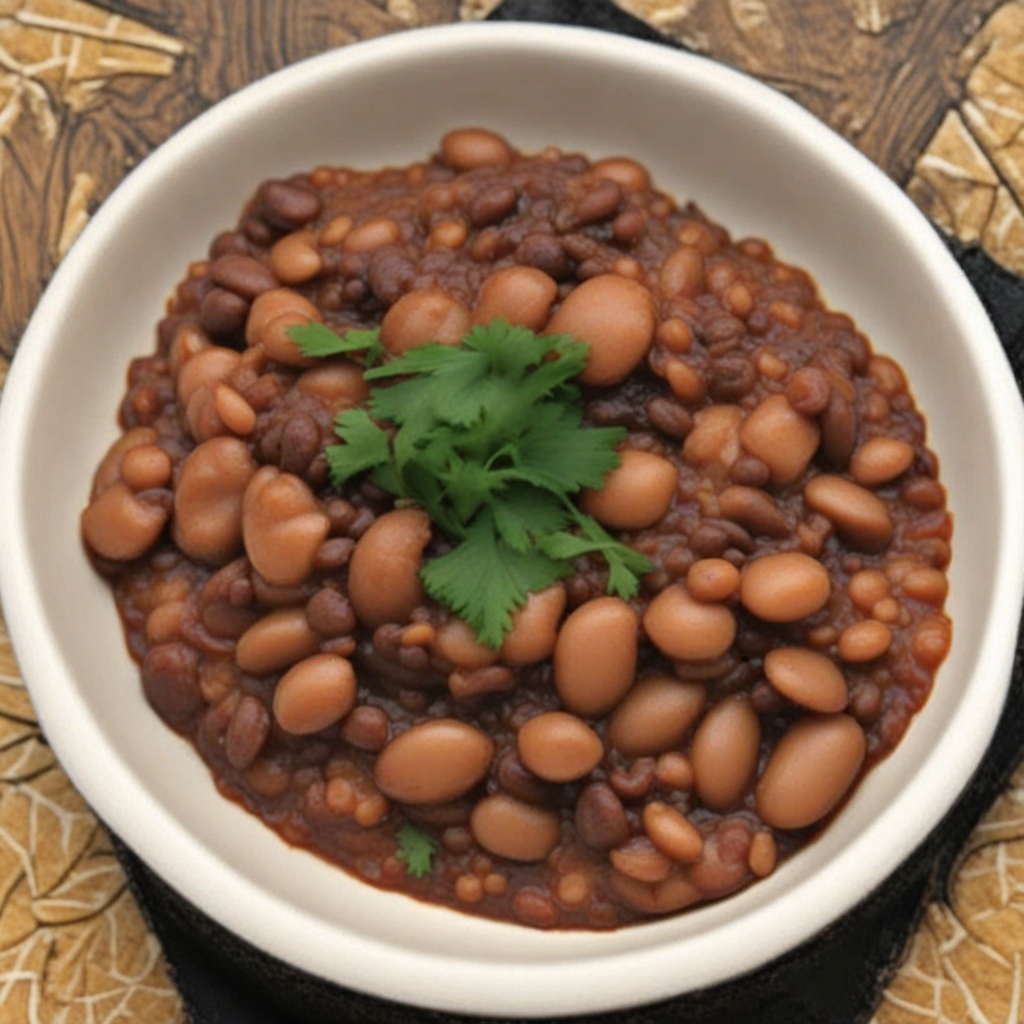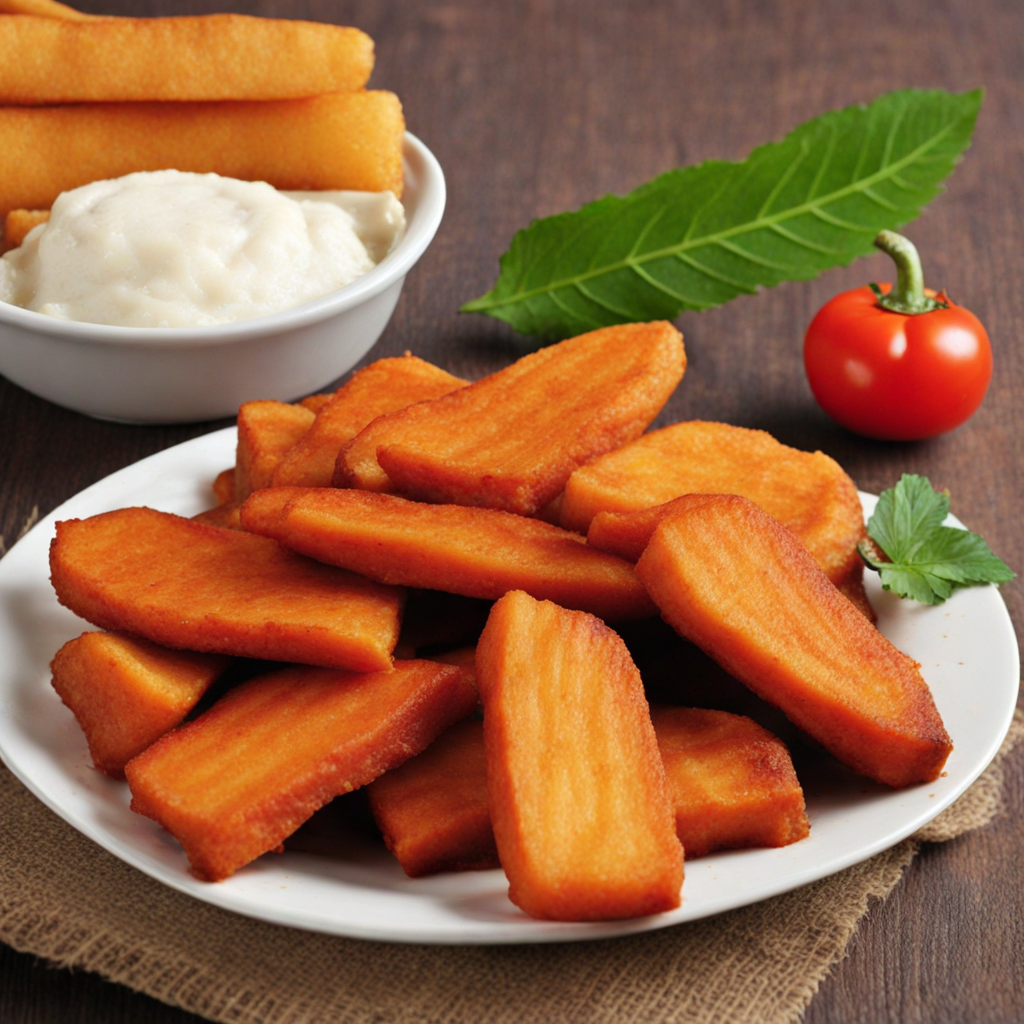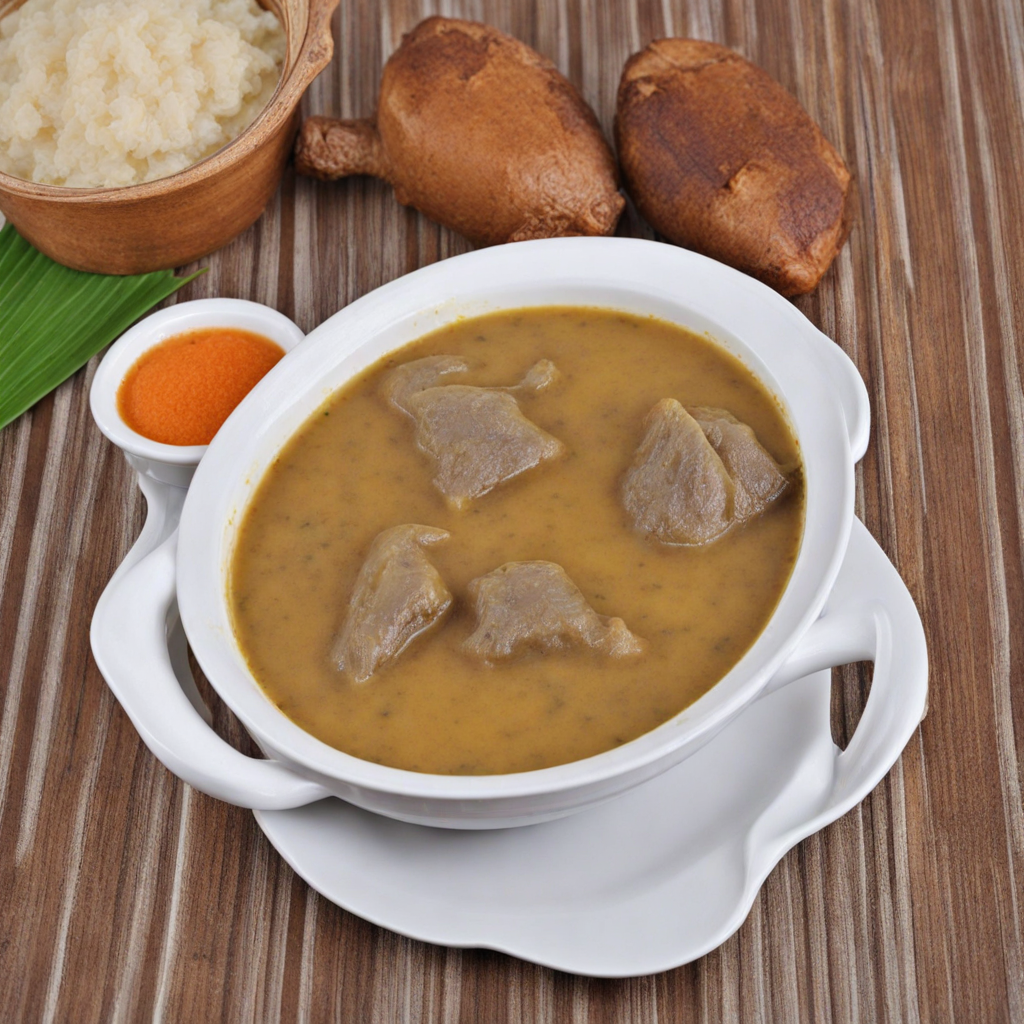Beans Porridge
Beans Porridge, known locally as "Ewa Riro," is a hearty and flavorful dish that showcases the rich culinary heritage of Nigeria. This porridge is primarily made from black-eyed peas or brown beans, which are slow-cooked until tender and then blended with a variety of spices and seasonings. The beans are often simmered in a rich sauce made from tomatoes, onions, and a mix of peppers, creating a vibrant and aromatic base. The result is a creamy and satisfying dish that is both filling and nutritious, making it a staple in many Nigerian households. The preparation of Beans Porridge involves several steps that enhance its depth of flavor. After boiling the beans to perfection, they are combined with sautéed onions, diced tomatoes, and a blend of ground spices such as paprika, cayenne pepper, and seasoning cubes. Some variations may include the addition of palm oil, which not only adds richness but also lends a distinctive color and taste to the porridge. The melding of these ingredients creates a delightful harmony of savory, spicy, and slightly sweet flavors that dance on the palate. Beans Porridge is often enjoyed alongside a variety of accompaniments, such as fried plantains, boiled yam, or rice, making it a versatile dish perfect for any occasion. It can be served as a comforting breakfast, a satisfying lunch, or a wholesome dinner. The dish is not only delicious but also packed with protein and fiber, making it a favorite for those seeking a nourishing meal. With its robust flavors and comforting texture, Beans Porridge is a culinary experience that invites you to explore the vibrant tastes of Nigeria.
How It Became This Dish
The History of Beans Porridge in Nigeria Beans porridge, known as "Ewa Riro" in Yoruba, is a cherished dish in Nigeria that combines the rich culinary traditions of the country with the practicalities of sustenance. This dish, primarily made from black-eyed peas or other varieties of beans, is not just a staple food; it embodies the essence of Nigerian culture, history, and community. #### Origins Beans have been cultivated in Africa for thousands of years, with archaeological evidence suggesting that their domestication dates back to around 3000-2000 BCE. In Nigeria, beans were likely introduced through trans-Saharan trade routes, where their nutritious value made them an essential part of the diet. The Yoruba people, one of the largest ethnic groups in Nigeria, have a long-standing relationship with beans, and their culinary practices have greatly influenced how beans porridge is prepared and consumed. Beans porridge is believed to have originated from the need to create a hearty, nutritious meal that could easily be prepared with minimal ingredients. The simplicity of the dish reflects the agricultural practices of many Nigerian communities, where beans are often grown in home gardens or small farms. The dish varies in preparation and ingredients across different regions, but the core elements remain the same: beans, water, and various seasonings. #### Cultural Significance In Nigeria, food is deeply interwoven with cultural identity, community ties, and social gatherings. Beans porridge serves as a symbol of togetherness, often enjoyed during family meals or communal gatherings. It is not just a dish but a means of storytelling, where each family may have its own unique recipe passed down through generations. Beans porridge is often associated with celebrations and significant events. In Yoruba culture, it holds a special place in ceremonies, such as weddings or traditional festivals, where it is served as a tribute to honor guests. The preparation and sharing of beans porridge can also be a communal activity, fostering bonds among families and neighbors. The dish is also an important aspect of Nigerian street food culture. Vendors often sell it in bustling markets and along busy streets, making it accessible to people from all walks of life. This has contributed to the dish's popularity and its status as a comfort food that transcends social and economic barriers. #### Development Over Time As Nigeria has evolved, so too has the preparation and presentation of beans porridge. Traditionally, the dish was made with simple ingredients: boiled beans, water, and spices. However, over the years, the introduction of varied ingredients has enriched its flavor profile and nutritional value. The classic version of beans porridge incorporates palm oil, onions, and spices such as pepper and locust beans (iru) for added depth. Some modern variations also include ingredients like tomatoes, ground crayfish, and assorted meats or fish, reflecting the diverse culinary influences that have permeated Nigerian cuisine. Regional variations have also emerged, showcasing the unique flavors of different Nigerian cultures. For instance, in the northern regions, beans porridge may be prepared with a more pronounced spice blend, while in the southeastern parts, it might be served with yam or plantain, reflecting local agricultural practices and taste preferences. The globalization of food culture has also influenced beans porridge. As Nigerians migrate and interact with other cultures, they bring their culinary traditions with them. This has led to fusion cuisines, where beans porridge is incorporated into international dishes or reimagined with new ingredients. For example, some chefs have experimented with using quinoa or lentils, catering to health-conscious consumers while still honoring the essence of the original dish. #### Nutritional Value Beans are an excellent source of protein, fiber, vitamins, and minerals, making beans porridge a nutritious option for many Nigerians. It is particularly significant in regions where meat is less accessible due to economic constraints. The dish provides a complete protein source when combined with complementary grains, such as rice or corn, which are often served alongside it. The nutritional value of beans porridge is further enhanced by the use of palm oil, which is rich in vitamins A and E, and other ingredients such as vegetables and spices that contribute to a balanced diet. This has made it a favored choice, particularly among families looking for both economic and health benefits. #### Modern Adaptations In recent years, there has been a resurgence of interest in traditional Nigerian foods, driven by a growing awareness of health and sustainability. Many chefs and home cooks are revisiting traditional recipes and adapting them to modern dietary preferences, such as vegetarianism or gluten-free diets. Social media has played a significant role in popularizing beans porridge, with food bloggers and influencers showcasing various recipes and cooking techniques. This has not only revived interest in the dish but also sparked conversations about the importance of preserving cultural heritage through food. Moreover, the Nigerian diaspora has embraced beans porridge as a means of connecting with their roots. In cities around the world, Nigerian communities prepare and share this dish, keeping the traditions alive and introducing it to new audiences. #### Conclusion Beans porridge is more than just a meal; it is a reflection of Nigeria's rich cultural tapestry. Its origins are deeply rooted in the agricultural practices of the region, and its evolution over time showcases the adaptability and resilience of Nigerian cuisine. As it continues to thrive in both traditional and modern contexts, beans porridge remains a vital part of Nigeria's culinary heritage, fostering community bonds and celebrating the rich flavors that define the nation. Whether enjoyed at home, in a bustling market, or at a festive gathering, beans porridge is a dish that nourishes both the body and the soul, a true testament to the power of food in shaping cultural identity.
You may like
Discover local flavors from Nigeria







